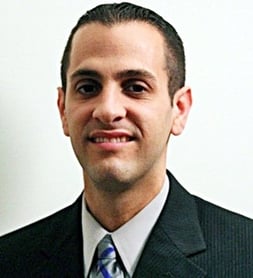Heller Search: Were you actively looking for a new CIO role?
Sean Cuttler: Yes, I was actively looking. At the time, I was Global Director of Planning and Technology at Celgene. Celgene is a great company, but it’s also a large company - $11 billion in revenue. I had come to realize that I could move the needle more at a small or medium sized firm, and be closer to the impact my work has on the business and on customers. Larger companies can bring political challenges, and I prefer to stay focused on the products, customers and revenue.
 Was a CIO position important to your search?
Was a CIO position important to your search?
Yes, I was specifically in search of a CIO role, or the equivalent. Prior to Celgene I was VP and Head of IT at a smaller company. For me, the leadership responsibilities as head of IT, and making decisions is a good fit for my profile. I wanted to lead the function once again, and be an enabler to other departments making a difference in improving healthcare outcomes.
What else were you looking for in your next job or CIO role?
An innovative company, a little smaller than where I was at Celgene. A company with high growth potential, cutting edge products and services, and a progressive leadership team.
How did you hear about the opportunity at CGI?
I have some great relationships with search professionals, and was working with several, but believe it or not I found this one online! It was posted on a career site, so I immediately connected with CGI’s CEO on LinkedIn and put my name in the running.
What piqued your interest in the position?
Oncology is a sector that I am passionate about. There are very few cures for the cancers we are working on here. There are lifestyle treatments, but it is still not an eradicated disease. I have a career background in it, but like so many people, I have also been personally impacted by cancer in my family. Someone in my family died from cancer when I was a young child so I have always been interested in it. It is more of a purpose for me than just a job.
Once I started discussions and interviews, I was really attracted to the management team. The interactions felt comfortable to me. My boss and the CEO are both down to earth and very experienced. I was attracted to their vision and I felt this was a world class company with significant potential.
Can you elaborate on their vision?
The CGI business model is unique for this industry. Rather than focusing solely on drug discovery or clinical testing, we are becoming an end-to-end provider. It is something we call “bench to bedside,” and it is a very big deal here. The “bench to bedside” approach ensures that R&D conducted in our labs translates into actionable information for clinicians and pharmaceutical companies, and treatment or drugs for cancer patients.
We have transformed CGI from a traditional clinical reference laboratory to an end-to-end drug discovery and clinical services company. We have transformed the business model and value proposition by increasing drug identification, drug rescue and drug repurposing capabilities to the healthcare value chain.
What about your professional background was attractive to CGI?
I think they found my broad experience in the life sciences to be relevant, as well as my medical device experience. The variety in my background was a good fit for the company’s "bench to bedside" strategy. We have a diverse array of clients including clinical institutions, hospital and pharmaceutical companies. And, we have important research collaborations with major cancer centers such as Memorial Sloan Kettering, The Cleveland Clinic, Mayo Clinic, Keck School of Medicine at USC and the National Cancer Institute.
They also wanted someone who had both domestic and international experience. We have operations in the US, China, and India. And a recent acquisition has just added sites in Germany and Australia.
How would you describe the culture at CGI?
Entrepreneurial. Before joining CGI our CEO ran a strategy and management consulting firm, and our COO is a veteran operations and financial executive. It is fast paced but also family oriented. It is also a patient-focused culture because the decisions we make have substantial effects on real lives around the world.
But in some ways, the culture here is still being shaped. For example, right now we are embracing 35 brand new colleagues in Australia, Germany and Pennsylvania. We are continuing to evolve and we’re doing so in a mature and thoughtful manner.
How did you prepare for your interviews?
In addition to being a technologist, I’m a business guy, so I read all CGI’s SEC filings, press releases and financials carefully. It's extremely important to truly understand the business/profit model, operating model and competitive positioning in the market.
Do you feel that was helpful at your interviews?
Without a doubt. It was probably game changing. My boss is the head of finance.
Financials are very insightful. Having all that background information on the company’s performance made the conversation very comfortable from day one.
I was able to have a very different conversation with them than what I assume they discussed with other candidates. We got deep into the company financials - cash flow, payables, receivables, and what these indicated in terms of customer acquisition. I felt I was able to ask intelligent questions.
Then I tied it all back to IT. How can technology improve cash collections, for instance? Or, the interface with customers, or performance in our labs, customer satisfaction, and so on.
In return, because we started with the financials, I feel they thought I had a solid understanding of their business. It definitely made for a great experience interviewing. At times, I felt like I was already working here.
Who do you report to at CGI?
The COO and EVP of Finance.
From day one, what steps did you take to learn the business and build relationships?
I started before day one because, to me, on day one you are already getting presented with challenges. My due diligence started when I was considering the job and they were considering me.
I spent a lot of time learning from my predecessor, who was here and available to me for a brief period. Additionally, the team here was (and is) great about providing me with information and historical decisions.
Once I started, I made a point to sit in the lab, meet the customers, and engage in planning meetings with senior leadership. I created a visionary IT roadmap, without any dates, because I first wanted to get buy-in. I used this to lay out a conceptual strategy with everything tied back to current business initiatives. Then I shared this with the entire management team (after my boss!) which helped shape my conversations.
Next, I got my boss and other executives to champion the IT roadmap almost as if it were their own. This way, by the time it was revealed to the business, it already had critical support. Rather than IT projects, these are business projects with technology at their core, each tying back to top line growth, reducing costs, or some other established business goal.
How have you developed a ‘business outcomes culture’ in the IT organization?
It can be challenging to change the culture in this way, but I am working hard at it. It is part of the coaching process. I am an adjunct professor, so fortunately, this comes naturally to me. It helps if I explain how our contributions in IT affect the company.
For example, one day someone came to me and reported that the help desk had cleared 1,500 tickets. But no one had thought to look for trends among the ticket information, or do any sort of root cause analysis. But that is starting to change now.
Did you find that anything that was 'on fire' and needed to be dealt with right away?
A lot of projects were on hold, so I had to reevaluate them quickly. Some weren’t presented well, or did not have financial diligence behind them. Some were reshaped, or had new proposals developed.
What else have you been working on?
We’ve introduced millions in new investments, but they are being paid for through contract renegotiations, elimination of redundant services, and getting better, faster and cheaper tools to replace old ones. For example, we had multiple phone systems, with multiple licenses and support vendors, which we have now consolidated.
We’ve rolled all those dollar savings into IT project investment and hiring so that there has been zero in new costs. And these investments are all necessary. They include network reliability, cyber security, and investments in AI.
What else has changed since you arrived?
IT is now positioning as a profit center. We are driving top line revenue coming from IT by offering a product to market that has potential to grow to become 10% of our revenue.
What more can you share about this new business line from IT?
It is about monetizing all of the data that we have. Data is the new gold.
For other companies developing cures and drugs, there is a large challenge they all face, which is getting patients to enroll in clinical trials. We have data that helps accelerate that, which saves a lot of money and ultimately moves new drugs through the pipeline faster. We call this solution CGI Match.
How do you know when your IT organization is succeeding?
The first indication is being viewed positively as a group and receiving positive feedback on how your team is serving the company, even when you haven’t asked for it.
Being a part of the business, sitting at the table and having a business conversation is an indicator of success.
To me, having a great team is also succeeding; when you see your staff focused on shared goals, and taking ownership.
The final step is when you can shift the value proposition of IT and make it a value center -- an enabler that drives the company forward, whether through cash collection or new revenue streams.
What new technologies do you find exciting personally?
Consumer and business technology are becoming as one. AI and deep learning excites me. It is everywhere. I just read about a new mouth guard for football players that monitors their vital signs. Advances in medicine using AI is game changing.
I also feel that the sharing economy, like Airbnb and Uber will continue to be huge and a challenge to current business models.
What advice do you have for an IT executive thinking about entering the job market?
Stay flexible and keep an open mind. Also, make sure you and the management team you are meeting with have a good comfortable working relationship. You can tell from conversations whether it was comfortable or awkward. Be passionate about the industry.
More generally, I would say all IT leaders should keep up with the times, and do their own research. There is a lot of excellent content out there. Never stop learning. I think that after a while, many executives stop learning.
Lastly, my advice is to give back. I serve on the board of a non-profit, and it has opened my mind and expanded my network.
About Sean Cuttler
Sean B. Cuttler is Head of Information Technology at Cancer Genetics, Inc. (CGI), a biotech firm specializing in DNA-based cancer diagnostics.
Prior to joining CGI, Cuttler held global leadership roles with increased responsibility at Celgene Corporation, Integra Lifesciences, Lifecell, Ipreo and Billtrust in a variety of business and technology positions. He holds an MBA from Rutgers University, an MS from the Stevens Institute of Technology, a BS from DeVry University, and has completed the Advanced Management Program at the Columbia Business School.


Written by Steve Rovniak
Steve Rovniak served as Executive Director, Marketing and Media at Heller Search Associates from 2012 to 2023.



